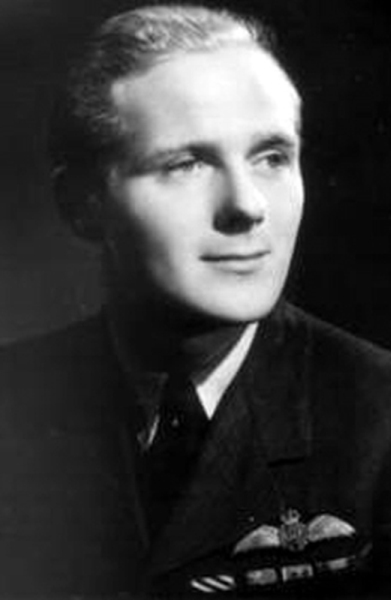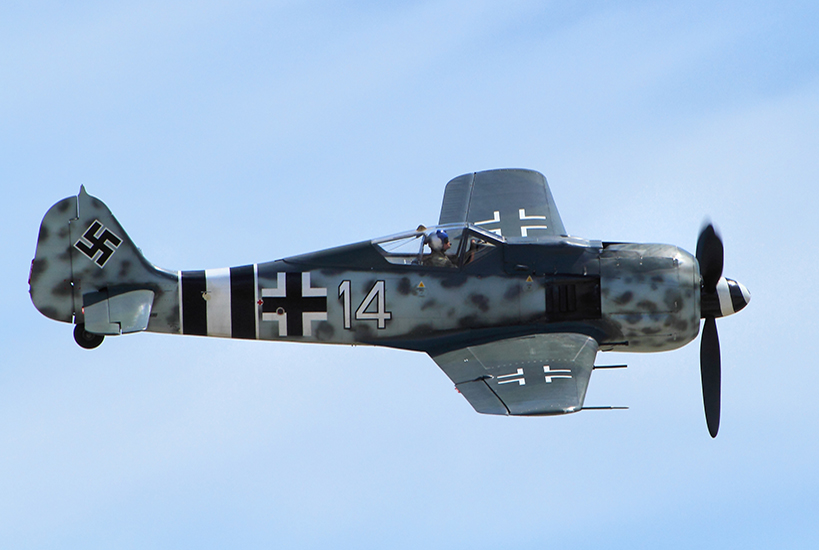Barthropp, Patrick Peter Colin "Paddy"
- Date of birth:
- November 9th, 1920 (Dublin, Ireland)
- Date of death:
- April 16th, 2008
- Service number:
- 41542
- Nationality:
- British
Biography
Paddy Barthropp was born in Dublin duriing a family visit. His mother died in childbirth and Barthropp was brought up and educated in Shropshire before going to Ampleforth. On leaving school he started to work as an engineering apprentice with Rover Cars in Coventry.
He joined the RAF on November 1st, 1938 on a short service commission and trained as a pilot. He was posted to No 613 Squadron, flying Lysanders on Army co-operation duties, and flew on operations in support of the British Expeditionary Force until the end of the evacuation from Dunkirk. In August 1940 he volunteered to transfer to Fighter Command. After a conversion training he was posted to No. 602 Squadron and subsequently No. 91 Squadron in February 1941. More restationings follwed until May 17th, 1942 when he was shot down by a FW-190 during a escorting mission when the controls of his Spitfire were badly dammaged. He was forced to bail out near St. Omer and was made POW. He was sent to Stalag Luft III near Sagan. But as he made an immediate escape attempt, the Germans transferred him to Oflag XXIB at Schubin in Poland, a Straflager for persistent escapers. He immediately started to organise a breakout through a 30-yard-long tunnel. Of the 32 who got out four were murdered by the Gestapo.
Barthropp managed to stay out of German hands and made contact with the Polish underground in Warsaw with a view to getting away to Yugoslavia through a partisan escape line. But in the end he was captured and was returned to Oflag XXIB, where at the end of January he was with other inmates assembled for what became known as the "Long March Westwards" and walked hundreds of miles in temperatures of 20 degrees below zero, with little food and less water. Barthropp reached Lübeck where he was liberated in May.
Barthropp remained in the RAF working in Norway locating the graves of missing airman.
He was then accepted, to his surprise, on a course to test fighter aircraft, including the first jets. In 1954, he left for an administrative post in Hong Kong. He wasn’t enthusiastic and took up horse racing in his spare time, and won a number of races at the Happy Valley racecourse.
He left the service in 1964 and set up a high class limousine hire firm in Paddington, London with his war time friend Brian Kingcome.
He was a great supporter of the Battle of Britain Fighter Association and for many years fought to get ex-PoWs the back pay they were denied. He greatly enjoyed country life, particularly shooting and fishing. He wrote an amusing autobiography, Paddy (1987), the proceeds of which went to the Douglas Bader Foundation.
Promotions:
September 3th, 1939: Pilot Officer (probation)
October 31st, 1939: Pilot Officer
September 3th, 1940: Flying Officer
September 3th, 1941: Flight Lieutenant
Augustus 5th, 1947: Squadron Leader
December 28th, 1957: Wing Commander
October 25th, 1964: Commission reisigned
Do you have more information about this person? Inform us!
- Period:
- Second World War (1939-1945)
- Rank:
- Acting Flight Lieutenant
- Unit:
- No. 91 (Nigeria) Squadron, Royal Air Force
- Awarded on:
- September 26th, 1941
"This officer has carried out one hundred and fifty operational sorties, many of them over enemy-occupied territory. Throughout, Flight Lieutenant Barthropp has displayed a fine fighting spirit, frequently attacking enemy aircraft, -troops and other targets on the ground. He has destroyed at least two, probably destroyed another and damaged three enemy aircraft."
- Period:
- Malayan Emergency (1948-1960)
- Rank:
- Acting Wing Commander
- Awarded on:
- June 10th, 1954
- Period:
- Second World War (1939-1945)
- Period:
- Second World War (1939-1945)
- Period:
- Second World War (1939-1945)
- Period:
- Second World War (1939-1945)
- Period:
- Second World War (1939-1945)
Sources
- Photo 1: Tom MacNeill
- - SHORES, CH. & WILLIAMS, C., Aces High, Grub Street, London, 1994.
- Fourth Supplement to The London Gazette Issue 35287 published on the 23 September 1941
- Original Decorations
- The Times - Obituaries
- Telegraph.co.uk
- https://www.thegazette.co.uk/London/issue/40188/supplement/3291/data.pdf
- The Miniatures of Wing Commander P. P. C. "Paddy" Barthropp, D.F.C., A.F.C














